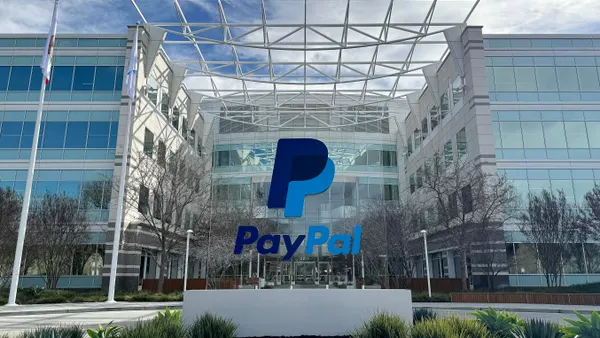Dive Brief:
- Venture funding for payments startups globally plummeted 75% for the second quarter to $2 billion, compared to the first quarter, according to a report from the research firm CB Insights. That was the biggest drop for any fintech category and it marked a six-year quarterly low for the payments category, the firm said.
- Nonetheless, payments businesses still attracted more money than any other fintech category, outpacing banking, wealth tech and digital lending categories, the CB Insights report issued last week showed.
- U.S. payments startups led the world, collectively, in terms of attracting money, bringing in $800 million in 52 rounds of fundraising for the second quarter, CB Insights reported. Asia took second place, with its payments players taking in $700 million for 33 investments.
Dive Insight:
The downdraft in venture dollars for young payments companies is a reversal of the flood of money that flowed to such startups in recent years. And it reflected a decline in dollars for the broader fintech industry.
Payments businesses logged record sums of capital inflows in 2021, with some $32 billion injected in them. Fast-expanding payments companies such as digital darling Stripe, buy now, pay later business Klarna and corporate expense management firm Ramp each vacuumed up hundreds of millions of dollars during that 2021 peak.
Times have changed. Investors’ interest in the payments sector has cooled as the post-pandemic economy has grown at a slower pace under the burden of higher interest rates.
The number of rounds of investing in payments startups for the second quarter fell, dropping 14% to 148 infusions of capital, relative to the first quarter, the CB Insights said. The figure decreased a whopping 46% compared to the same quarter last year.
Now, venture investors are more interested in holding their funds and seeing startups prove themselves with profits. Indeed, “dry powder,” or the money that venture capital funds have on hand for later investment, is at an all-time high of $279.8 billion for U.S. funds, according to a Pitchbook report this month.
Still, a handful of payments players are defying the trend and pulling in venture capital. Topping the list of payments companies that landed investments during the second quarter was San Mateo, California-based Tipalti, according to CB Insights. Tipalti, which equips middle-market businesses with software used in cross-border payments to suppliers and vendors, raised $150 million in May.
Other U.S. payments startups that also managed to draw investments during the quarter were Fort Collins, Colorado bill-pay company BillGO, Austin, Texas-based payments technology provider Episode Six and Santa Clara, California-based payments acceptance technology business PayNearMe.
Early-stage payments startups collected more venture capital during the first half of this year than their more mature peers, soaking up 75% of all funds invested, the CB Insights report showed. By contrast, early-stage payments businesses attracted a lesser 67% of funding during all of last year.
The average amount that investors injected into a single payments fundraising round rose to a higher level for the first half of this year than for each of the past four years, except 2021, climbing to $38.4 million, according to CB Insights.












